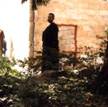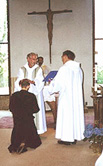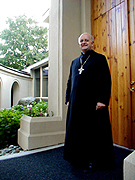<
Previous Page
"What
is
a Monk?" continued
WORK
 The
work taken on by the monks depends on the needs of the community and
the
capacity of the individual monk. With prayer, work is another
hinge
which supports the monastic life. Like prayer, work is for the
good
of the individual and community, but it also unites the monk with the
experiences
of those who labor for the sustenance of their lives. Since work
by its very nature (whether it be manual or intellectual) in some way
or
another is geared toward improving or sustaining life, it is also
considered
a participation with God in His work of creation.
The
work taken on by the monks depends on the needs of the community and
the
capacity of the individual monk. With prayer, work is another
hinge
which supports the monastic life. Like prayer, work is for the
good
of the individual and community, but it also unites the monk with the
experiences
of those who labor for the sustenance of their lives. Since work
by its very nature (whether it be manual or intellectual) in some way
or
another is geared toward improving or sustaining life, it is also
considered
a participation with God in His work of creation.
SILENCE

Although
it is not a vow, the monk seeks silence so that he may be attentive to
God’s presence. Reflecting on and being aware of God’s
presence
is
prayer in and of itself. Finding God in silence leads the monk to
a greater sense of unity with the Lord. This does not mean that
the
monk is anti-social, but he is constantly aware of God's presence and
desires
not to be distracted from it by noise or unnecessary chatter. The
silence which the monk cherishes allows him (when he does speak) to say
things that are edifying and prudent.
THE
VOWED
LIFE
 All
monks take vows which bind them to the community in which they
live.
Before he professes the vows has an extended period of preparation so
that
he can freely choose to profess them. The vows are not meant to
be
hindrances to personal freedom, rather the vows actually free the monk
to give himself entirely to God. The monk chooses not to get
married,
but devote himself to God through a celibate life. It is a choice
for the monk to allow himself to be guided by a superior of the
monastery
because he believes that God is leading him through the superior.
There is a personal choice made when the monk takes on a spirit of
poverty
which allows him to appreciate the gifts that God has given him and use
them wisely. Essentially the vows enable the monk more freedom to
seek God as the central focus of his life.
All
monks take vows which bind them to the community in which they
live.
Before he professes the vows has an extended period of preparation so
that
he can freely choose to profess them. The vows are not meant to
be
hindrances to personal freedom, rather the vows actually free the monk
to give himself entirely to God. The monk chooses not to get
married,
but devote himself to God through a celibate life. It is a choice
for the monk to allow himself to be guided by a superior of the
monastery
because he believes that God is leading him through the superior.
There is a personal choice made when the monk takes on a spirit of
poverty
which allows him to appreciate the gifts that God has given him and use
them wisely. Essentially the vows enable the monk more freedom to
seek God as the central focus of his life.
THE
MONK’S HAPPINESS 
Many
people find it difficult to believe that a monk can have a happy life
without
the possibility of marriage, family, independence
and money. But
if the monastic life is lived well by the monk, the possibility of
happiness
is infinite (literally). Often, the notion of happiness
(especially
in today’s society) is very distorted because it is equated with
pleasure
or the accumulation of material things. Human beings only find
true
happiness and contentment if they do what they were created to
do.
Everyone by the vocation of their humanity was created to discover,
know
and love their creator. This is the monk’s sole focus in life
which
brings the monk the happiness that does not depend on finite things.
<
Previous Page
 The
work taken on by the monks depends on the needs of the community and
the
capacity of the individual monk. With prayer, work is another
hinge
which supports the monastic life. Like prayer, work is for the
good
of the individual and community, but it also unites the monk with the
experiences
of those who labor for the sustenance of their lives. Since work
by its very nature (whether it be manual or intellectual) in some way
or
another is geared toward improving or sustaining life, it is also
considered
a participation with God in His work of creation.
The
work taken on by the monks depends on the needs of the community and
the
capacity of the individual monk. With prayer, work is another
hinge
which supports the monastic life. Like prayer, work is for the
good
of the individual and community, but it also unites the monk with the
experiences
of those who labor for the sustenance of their lives. Since work
by its very nature (whether it be manual or intellectual) in some way
or
another is geared toward improving or sustaining life, it is also
considered
a participation with God in His work of creation.

 All
monks take vows which bind them to the community in which they
live.
Before he professes the vows has an extended period of preparation so
that
he can freely choose to profess them. The vows are not meant to
be
hindrances to personal freedom, rather the vows actually free the monk
to give himself entirely to God. The monk chooses not to get
married,
but devote himself to God through a celibate life. It is a choice
for the monk to allow himself to be guided by a superior of the
monastery
because he believes that God is leading him through the superior.
There is a personal choice made when the monk takes on a spirit of
poverty
which allows him to appreciate the gifts that God has given him and use
them wisely. Essentially the vows enable the monk more freedom to
seek God as the central focus of his life.
All
monks take vows which bind them to the community in which they
live.
Before he professes the vows has an extended period of preparation so
that
he can freely choose to profess them. The vows are not meant to
be
hindrances to personal freedom, rather the vows actually free the monk
to give himself entirely to God. The monk chooses not to get
married,
but devote himself to God through a celibate life. It is a choice
for the monk to allow himself to be guided by a superior of the
monastery
because he believes that God is leading him through the superior.
There is a personal choice made when the monk takes on a spirit of
poverty
which allows him to appreciate the gifts that God has given him and use
them wisely. Essentially the vows enable the monk more freedom to
seek God as the central focus of his life.
